Hiring Managers Weigh In On the Demand Gen Compensation Report and Whether Job Hopping is a Red Flag 🚩

Table of Contents
Maximize Your Marketing ROI
Join 10,000 other marketers already getting the best tips on running engaging events that boost pipeline and create raving fans.
Our annual Demand Generation Compensation Report has been causing quite a stir lately—and for good reason! It's packed with eye-opening insights about what demand gen marketers make, how remote work can influence salary, how people bounced back after layoffs, and more.
For this special session of Donuts & Demand, Kelly Cheng, Goldcast's Head of Marketing was joined by Justin Swisher, Director of Global Business Recruiting at Apollo.io and Lia Zneimer, VP of Marketing at Teal. As a group, they discussed some of the key insights from the report and offered marketers advice they can use throughout their careers.
Read on to learn:
- Demand gen salary and major factors that influence it
- Always view listed salaries as flexible
- Don't be afraid to chart your own path
- Proactively take on responsibility before being asked
- Advice for marketers affected by layoffs
- Final Q: Is it a red flag to jump around from job to job? 🚩
Btw, if you haven't already read the full report, snag your copy below and follow along as we discuss!
Demand gen salary and major factors that influence it
Here's a brief rundown of the major insights from this year's report, compiled from data provided by 229 marketers across the globe (but primarily in the United States).
The average demand generation marketer's salary clocks in at $126,402.
We also found that salary goes up significantly with promotions, rising by 130% from the associate to managerial levels. Take a look:
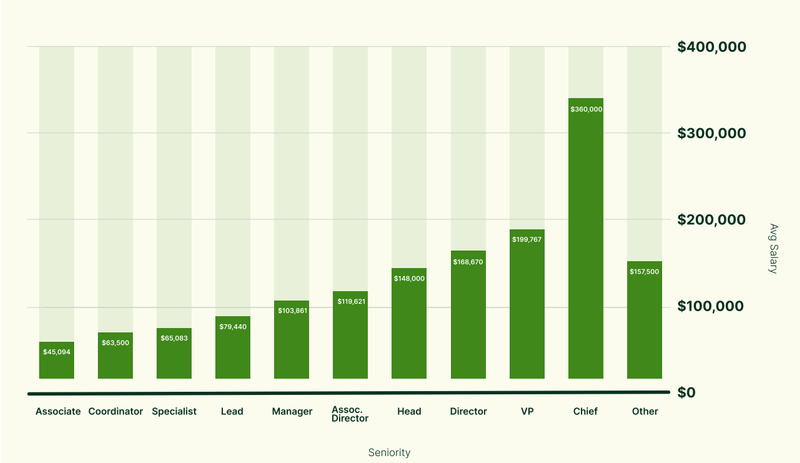
Another interesting finding was that over 54% of demand gen marketers received bonus pay.
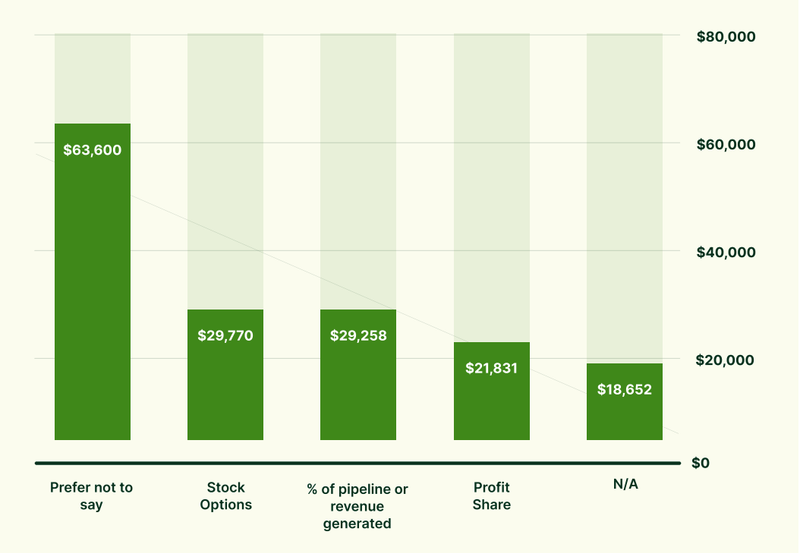
Most of the companies that offer bigger bonuses tended to be bigger in size, which makes sense as oftentimes larger companies have more resources. This may also indicate that if you work for a large org and aren't getting bonuses, it's time to negotiate!
The final insight we want to highlight here is related to management roles and compensation. We saw this year that marketers who are responsible for budget and/or people management make more money than those who don't.
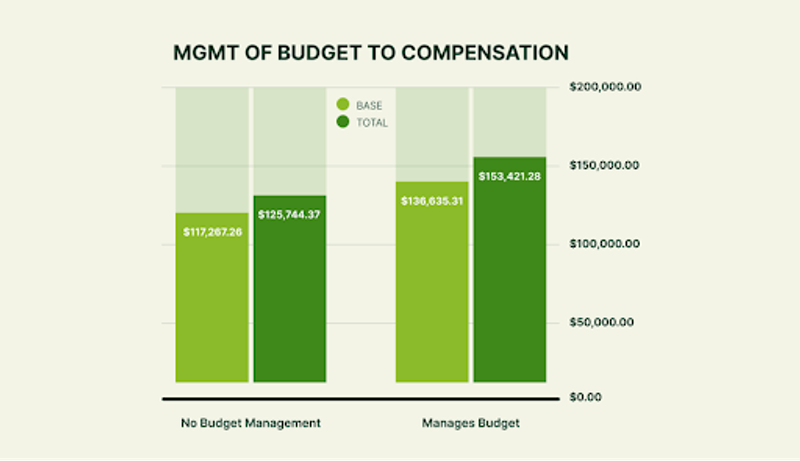
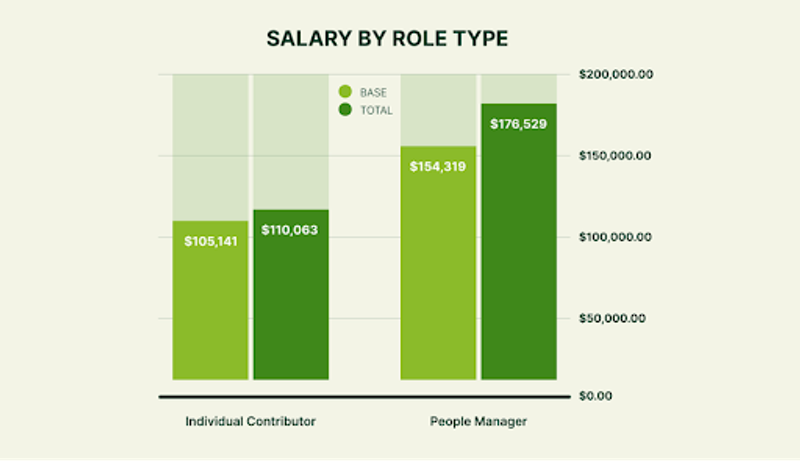
Now, if you're a demand gen marketer looking at these findings, and you want to make more money, you might be wondering how to go after a promotion, highlight your work history to be most advantageous, or take on additional work to warrant higher pay. Read on for advice on how to do that!
Always view listed salaries as flexible
Justin recommends that you always view job postings as flexible. If you see a salary range provided on a job description, don't read too much into that—by his estimation, about half of the jobs out there are probably flexible in terms of the scope and level of the job, and your expertise can influence the salary you get in the end.

Demand generation is also closely tied to revenue and sales, and there may be an opportunity for you to leverage that as a way to get higher compensation than what's listed in the job description.
Don't be afraid to chart your own path
Keep in mind that you have much more agency than marketers in decades past. We are in control of our careers—gone are the days of companies charting out people's career paths and developmental plans for them!

This means that you should be building up your skillset and thinking about your career as a long-term investment. If your company has a learning and development stipend, take advantage of that. Or, if you can budget your own money into professional development, that works too.
And if you're feeling like you need permission to take control of your own development, check out Lia's advice below:
Be sure that you also keep track of your successes. You'll need to be your own salesperson throughout your career, and being able to articulate the financial impact of the campaigns you've worked on is huge. (Another way to think of this is that we marketers are our own marketers—although it's always hardest to turn our expertise on ourselves!)
PS: If you need help keeping track of your wins, Lia let us know that Teal's resume builder is designed to allow you to pop in, add achievements as they come up, and collect all those relevant metrics so they're waiting for you when it's time to design your updated resume. Your future self might thank you for this one!
Proactively take on responsibility before being asked
If you're stuck on the finding about how demand gen marketers who oversee budget and staff members make more money, here are some ways you can join their ranks.

It's natural to want to be promoted before you take on more responsibility. However, if you take on more tasks now, you put yourself in a good position for the future. That's not to say you shouldn't advocate for yourself or receive fair pay for the work that you do, but sometimes taking the initiative to do some of that work now can prove that you're ready for it in a more official capacity.
If you want to do this, think about informal ways you could dabble in people management. Perhaps you seek out a mentorship opportunity with junior folks at the company and have lunch-and-learn sessions with them. Then, when it comes review time, you can show your manager that you may not have direct management experience, but you do have these mentee relationships that you've been investing in.
In Justin's recruitment experience, bigger companies expect someone to meet a certain level of performance for 1-2 quarters before they promote them—even more reason to get started in accessible ways now, so that you can point to all the ways you've shown you're ready to manage money or other people at the company.
Advice for marketers affected by layoffs
A new finding this year was that 21% of demand gen marketers experienced a layoff in the last two years—with 1.3% laid off in both 2022 and 2023. We also discovered that of those who were laid off, 60% increased their salary—pretty interesting!
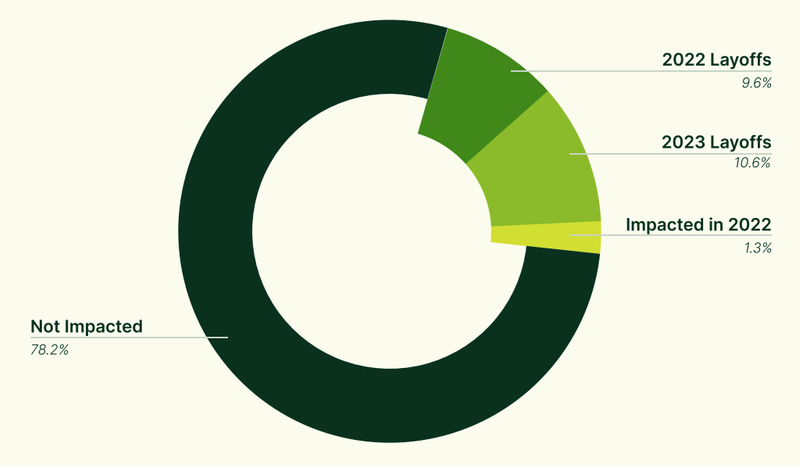
Of course we want to think that everyone who gets laid off will find a better, more lucrative role, but it's not that simple. We wanted to know if our panel had any tips for people who've been laid off and looking for new roles. Here are Justin's best tips:
Too long, didn't watch? Here's a quick summary:
- Be intentional. Applying for jobs is not just a numbers game, where you need to apply for the most jobs to the exclusion of all other factors. Focus on the highest-quality, most relevant jobs and direct your efforts toward matching your application materials (honestly—don't embellish!) to those jobs.
- Be realistic and honest with yourself. If you aren't at all qualified for a role, it might not be the best use of your time and energy to apply for it.
- Think about where you want to go with your career, and develop a plan to get you there. You can reverse engineer this by looking at roles that interest you and learning what experience is required to apply for them.
- Don't be discouraged! The whole process takes time. Networking and socializing are much more valuable than blanket-applying for jobs; it's harder work, but the payoff is greater.
- Finishing touches matter. A really nice follow-up email after an interview or conversation can be the icing on the cake for recruiters and solidify you as the ideal candidate.
The Teal team found that for folks who landed jobs in 2023, each interview took about seven tailored applications. That might not sound like a lot, but it does take work to tailor each application and cover letter to match the role you're applying for in order to present yourself as a highly qualified candidate.
Your resume should always speak directly to the job you're applying to. Look at the job description and then tactically look at your resume. Does every single bullet point lead a recruiter to understand how you're qualified for this job? Why is each item important and relevant? If it's not either of those things, remove it!
This work, though it may seem tedious, can set you apart from other candidates in a tight market.
Final Q: Is it a red flag to jump around from job to job? 🚩
Many marketers these days job hop, and if you're wondering whether that shows up as a red flag for recruiters, the answer isn't a simple yes or no.

When Justin started his career 15 years ago, professionals tended to stay in one place. That's changed! Candidates are aware now that the best way to increase your salary over time is to change jobs every couple of years, and their actions reflect it.
However, consistency and loyalty still matter. There's something to be said for sticking it out with a company over a period of time and the learnings that stack up when you go through both good and bad times with the same org—however, this typically only applies when you're growing with the company. Being in the exact same role for 15 years at the same company might not look as good to a recruiter and could come off like complacency instead.
What do you think of our experts' advice? If you want even more tips—including some big no-no's when applying for jobs—catch up on the full replay below and sign up for our next session while you're at it!
Transform Your Video Marketing with AI
Stay In Touch
Platform
Resources
© 2025 Copyright Goldcast, Inc. All rights reserved.





 Upcoming Events
Upcoming Events Event Series
Event Series On-Demand Events
On-Demand Events

